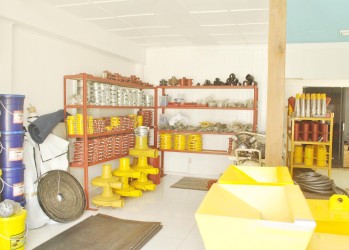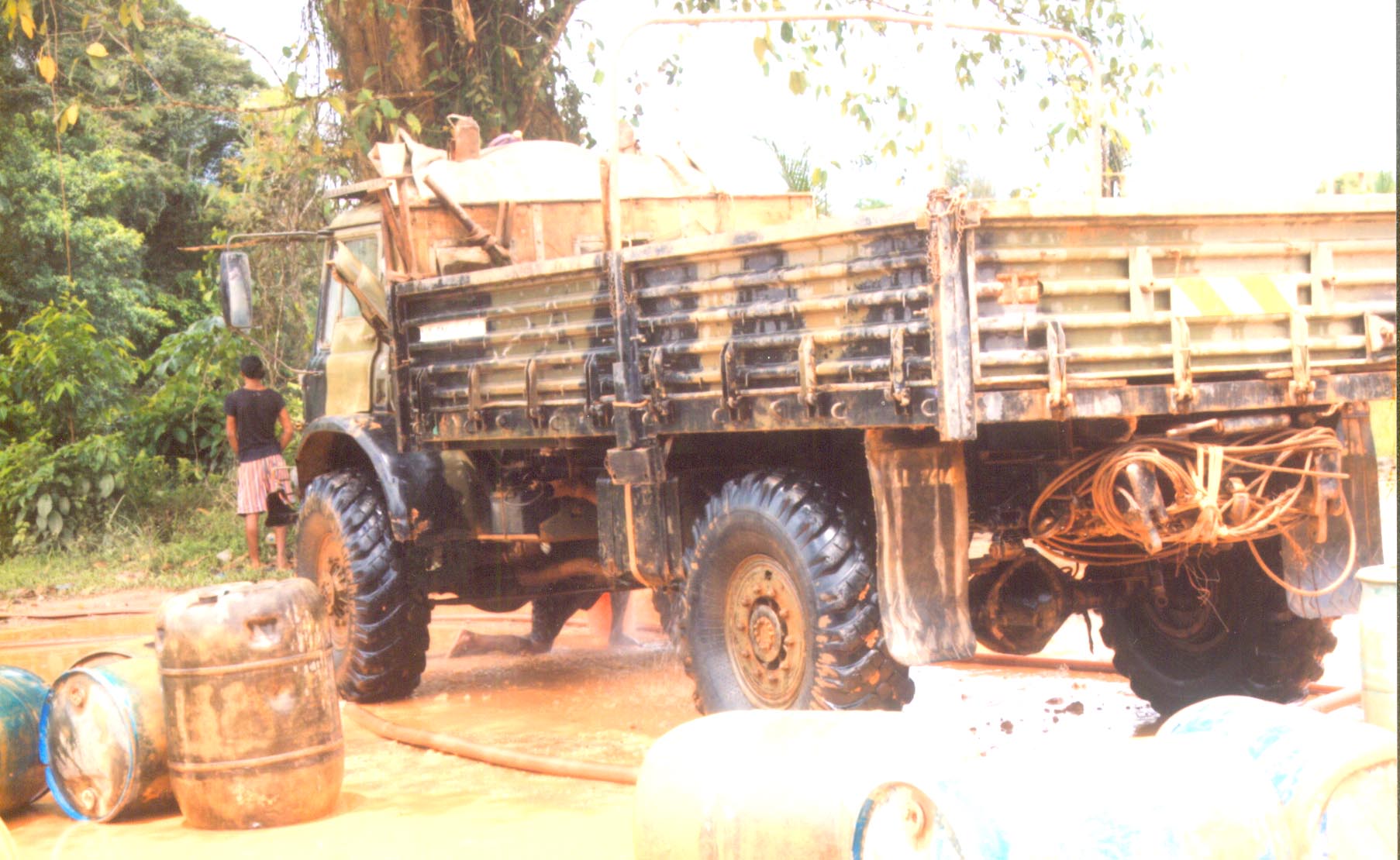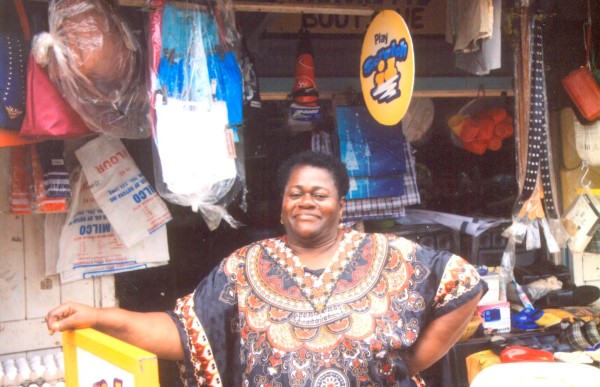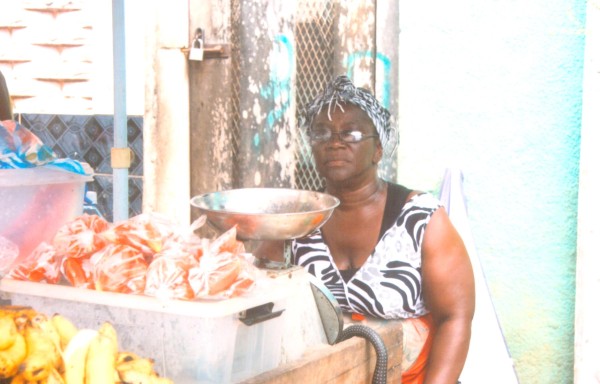Every conceivable economic activity at Port Kaituma revolves around the gold-mining industry so that it is hardly surprising that the downward spiral in the price of gold has cast a pall of gloom over the community. Not that business has dried up altogether. The bigger mining operations persist on the cushion that they had created. Many of the smaller ones, the hustlers—at least most of them—have packed up and gone. So have the miners from Brazil and Venezuela who had persisted because there was no way of keeping them out. Port Kaituma’s economy also found room for women who sold themselves. That market, too, has dried up.

The residents of the community say that two years ago Port Kaituma was a far cry from what it is now.
When Stabroek Business visited the township last week we spoke with a range of businesspeople: fruit vendors, taxi drivers, mechanics and a hotel owner. All of them operate businesses that revolve around the fortunes of the gold mining industry. Each, in turn, has a disconsolate tale to tell. The fruit vendors and grocers rely on the patronage of the small miners. The wealthier miners fetch their supplies in from Georgetown. The pressure associated with the drop in the price of gold hit the small miners first and for the vendors offering fruit and vegetables on the waterfront and elsewhere in the township patronage is down.
Small business operators from coastal Guyana who had found their way into Port Kaituma to take advantage of the ‘gold rush’ are now in a state of indecision. One of the vendors, Carol Clarke, who used to vend fruit and vegetables outside Stabroek Market moved to Port Kaituma since 2009. She currently operates at the waterfront. She buys her fruit and vegetables from boats that bring produce from Seabi, a farming settlement situated about ten miles along the Seabi River off Port Kaituma. Clarke is one of those vendors who depended on the patronage of the small miners. With mining operations having reduced significantly she is stuck with a situation that is fraught with uncertainty.
The taxi drivers depend on patronage from residents and from the business community. Much of the travelling is linked to commercial activity and the decline has meant that transportation is not as lucrative a business as it used to be.
The roads in Port Kaituma are shared by pedestrians, cars and trucks laden with supplies for the goldfields. Not surprisingly, the community has what are probably some of the worse kept public streets in Guyana. A ‘short drop’ in Kaituma will set you back $1,000. The taxi drivers say they need to find ways of keeping up with the maintenance of their vehicles, and there are only a handful of mechanics at Port Kaituma. The roads are grotesquely cratered and dusty. When it rains the surfaces are unending pools of slush; during the dry periods there are endless clouds of dust. The wash bays here do brisk business. Washing a car will set you back $2,000. A ‘bush’ truck costs $5,000 to wash.
Trucks plying the route from Port Kaituma to the gold-mining or ‘backdam’ areas like Big Creek, Five Star, Eye Lash, Monasi, Baramita, Fourteen Miles, Tiger Creek and Arakaka have far more gruelling experiences. To drive a truck from Port Kaituma to these mining locations the operator must have much more than rudimentary knowledge of mechanical engineering. It is a question of when rather than if, the roads will inflict some measure of damage on trucks heading for the ‘backdam.’
Port Kaituma has a 36-room hotel officially named The Five Sisters but more commonly known as Mow Hotel. The vast majority of the township’s guests stay here. The environment of the hotel is sufficiently pleasing and the rooms are self-contained and comfortable. At $8,000 per night for accommodation it’s a good deal.
Verer Singh manages The Five Sisters for an Essequibian investor named Deon Stoll. The two had once worked in the gold-mining industry together. The hotel, a product of the mining sector, has done well over the years. Miners and businessmen stay there. Up to a year and a half ago The Five Sisters used to have maximum occupancy. These days occupancy is down to around 18 rooms.
Electricity bills account for a large slice of the running costs. The Five Sisters pays around $150,000 per month and while the community is serviced with electricity for 13 hours daily the service they get is at least predictable. The hotel has been forced to further increase its running costs by investing in a Perkins generator to provide power for the remainder of the day.
When Stabroek Business visited the township last weekend both of the engines that bring water from a well at Citrus Grove were down and
had been that way for the past two weeks. Fitz Duke, the man in charge of the service says that a part for one of the engines had been imported and was currently at Ogle waiting to be taken into Port Kaituma. Duke was hopeful that by last Monday a regular service would be restored.
Evidence of a township that had anchored itself to the gold mining industry is reflected in the fact that most consumer goods are imported into Port Kaituma. Apart from its 15 passengers the Air Services Ltd flight that went to Port Kaituma on Thursday morning was carrying bora, celery, bread, eggs, cabbage and carrots among other things. Air freighting costs $105 per pound which costs, naturally, are added to the retail price. Once the economy of this intrepid township continues its current downturn its residents will have to rely much more on growing and making their own food.
At the waterfront the evidence of the boats that come also reflects the near complete dependence of this community. Everything, it seems, from bread to sand has to be brought here and there is no indication of any meaningful investment in industries that might reduce the dependency whilst creating jobs. Given the community’s near complete dependence on imports the absence of a wharf facility is a glaring deficiency which simply must be remedied in the shortest possible time.
From an economic standpoint and given the uncertainties associated with the price of gold, it would hardly be an overstatement to say that Port Kaituma – perhaps like so many other interior townships – stands imperiled, unless some new model for its development can be crafted.
Worryingly, the mindset of the residents of Part Kaituma does not appear to extend much beyond an economy that relies on gold. It is a ‘quick money’ syndrome that distracts from options for growth and makes the creation of a stable township more difficult. For real development to happen here young people will have to be persuaded of the virtue of remaining in school then moving onto other forms of training. That is a responsibility that government, particularly the Ministry of Education, along with parents will have to undertake.
President David Granger may have promised to take upgraded technical education to interior communities but it is clear that it will be no easy task to persuade the young men of this community not to head for the ‘back dam’ even before they are properly into their teens. Here, it is really no different from other countries where the lure of gold has made victims out of people who simply refuse to come to terms with the vagaries of an industry the fortunes of which are dictated by circumstances over which they simply have no control.









